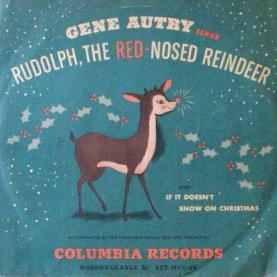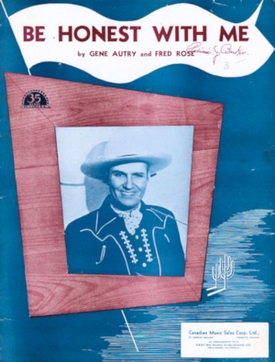"Too Late to Worry, Too Blue to Cry" is a 1942 song by Al Dexter. It was recorded on March 18, 1942 at the CBS Studio at Radio Station KNX, Sunset Blvd., Hollywood, California with session musicians Frank Marvin, Johnny Bond and Dick Reinhart. It was released on Okeh records #6718 on February 6, 1944, paired with "So Long Pal". It went to number one on the Folk Juke Box charts for two weeks and stayed on the charts for a total of thirty weeks.

"Rudolph, the Red-Nosed Reindeer" is a song by songwriter Johnny Marks based on the 1939 story Rudolph the Red-Nosed Reindeer published by the Montgomery Ward Company. Gene Autry's recording hit No. 1 on the U.S. charts the week of Christmas 1949.
"Luther Played the Boogie" is a song written and originally recorded by Johnny Cash. Luther is Luther Perkins, the guitarist in Cash's band.
"Thanks a Lot" is a song originally recorded by Johnny Cash. It was written for him by Charlie Rich.
"The Ways of a Woman in Love" is a song originally recorded by Johnny Cash. It was written for him by Bill Justis and Charlie Rich.
"You're the Nearest Thing to Heaven" is a song co-written and originally recorded by Johnny Cash.
"All Over Again" is a song written and originally recorded by Johnny Cash. He recorded it for his first single on Columbia Records.
"It's Just About Time" is a song originally recorded by Johnny Cash. It was written for him by Jack Clement.
"I Just Thought You'd Like to Know" is a song originally recorded by Johnny Cash. It was written for him by Charlie Rich.
"You Tell Me" is a song originally recorded by Johnny Cash. It was written for him by Roy Orbison.
"Smiling Bill McCall" is a song written and originally recorded by Johnny Cash.
"The Rebel – Johnny Yuma" is the theme song for the ABC-TV series The Rebel. It was written by Richard Markowitz (music) and Andrew J. Fenady (lyrics) and recorded by Johnny Cash.
"When I've Learned" (also known as "When I've Learned (Enough to Die)") is a song written by Buddy Killen, Ray Baker and Delbert Wilson. and released in 1958 as a single (Columbia 4-41288) by Bobby Lord.
"The Sons of Katie Elder" is the theme song for the 1965 Paramount western of the same name starring John Wayne. It was written by Ernie Sheldon (words) and Elmer Bernstein (music).
"Happy to Be with You" is a song co-written by Johnny Cash with June Carter and Merle Kilgore.
"The Wind Changes" is a song written and originally recorded by Johnny Cash.
"Red Velvet" is a song written by Ian Tyson and recorded by Johnny Cash. While the Cash version is the best known, it was first recorded by Ian & Sylvia Tyson in 1965 on their album Early Morning Rain.
"Rosanna's Going Wild" is a song written by June, Helen and Anita Carter for Johnny Cash.
"See Ruby Fall" is a song co-written by Johnny Cash and Roy Orbison. The title is a play on the phrase "See Ruby Falls", which is painted on some Southern barn roofs to direct potential tourists to a well-known waterfall in Chattanooga.

"Be Honest With Me" was a 1940 song by Gene Autry and Fred Rose. The recording by Autry was one of the big Hillbilly hits of 1941, and was nominated for the 1942 Academy Award for Best Original Song.


